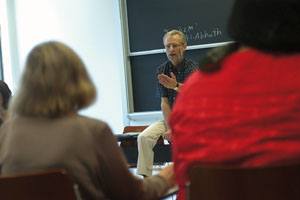Summer institute energizes professors’ teaching of Islam’s role in world history
By Jennifer CarnigNews Office
 Fred Donner, Professor in Near Eastern Languages & Civilizations, leads a session in the Summer Institute on Culture and Communication in the Pre-Modern Islamic World. Donner created the program with funding from the National Endowment for the Humanities. | |
When they began their coursework in the Summer Institute on Culture and Communication in the Pre-Modern Islamic World, they were 25 teachers from a range of disciplines seeking ways to engage their students in Islam’s role in world history. When the institute ends, they will leave as energized scholars with a deeper knowledge of Islam and ideas about how to share that knowledge.
Created by Fred Donner, Professor in Near Eastern Languages & Civilizations, and funded by the National Endowment for the Humanities, the six-week institute brings faculty members to Chicago from two- and four-year colleges across the country. Here, they are exploring the interactions between Islam and politics, culture and commercial enterprise in the premodern world (up to about 1600).
The faculty attend class five days a week and study side-by-side with Donner, institute co-director and Ball State South East Asian studies professor Kenneth Hall, and six guest instructors who lecture on the emergence of Islamic societies in regions of the non-Western world.
The goal of the program is to offer professors who teach in a range of disciplines—from art history to political science—an introduction to Islam in the Near East, Asia, Africa and Eastern Europe so they, in turn, can “offer their students a more nuanced and historically grounded view of Islam’s role in world history,” Donner said. Through the class sessions, readings, visits to the library and the Oriental Institute, and discussions with one another, the participants will familiarize themselves with “the scholarly issues and debates surrounding the rise and continued spread of Islam.”
Donner held the first institute in 2000 as a way to “try out some ideas I wanted to float.” The first institute focused on Islamic origins, and specifically the beginnings of Islam in the Near East during the sixth and seventh centuries. It was then that he met Hall, a participant, who now co-directs the institute.
“We found that we had a lot to share with each other, and so we worked together extensively that summer,” Hall said. The partnership was a logical next step for the institute, he said, because Donner’s knowledge of the origins of Islam in the Near East were complemented perfectly by Hall’s work on Islam in Southeast Asia. When the institute was held for a second time in 2002, it shifted to accommodate both professors’ expertise and became a medium for participants to view the global Islamic community.
Now in its third incarnation, both Donner and Hall said they keep participating in the institute because of the intellectually rigorous discussions that occur every day in class.
“Hearing what my colleagues in the program have to say has really impacted my writing,” said Hall, who credits the participants’ tough questions and challenging discussions for the two books he just sent to press and the two manuscripts on which he currently is working. “It has really evolved into a thinktank-type environment. We’re all really learning from each other.”
In a recent Monday morning class, participants debated about everything from the role of women in Islam and the qualifications for leaders in the early Islamic community to pedagogical issues and how to determine the value of a historic source.
F. Rachel Magdalene, a religion professor at Augustana College in Rock Island, Ill., said lively discussion is typical of the group, and she credits the time spent in an intellectual community bound together by a shared interest in Islam with energizing her as a scholar.
“It’s not often that you’re in a classroom where every single person wants to be there,” Magdalene said. “Everyone is engaged, and the conversation is amazing. It’s an exciting atmosphere.”
Just having the gift of time to do nothing but study and write for six weeks makes the experience worthwhile, she said, not to mention having access to all of the University’s library and museum resources.
Each participant is given the opportunity to explore the different aspects of “the problems of culture and communication in the Islamic tradition,” Donner said. Each professor must choose a project that meets his or her own interests and needs in the classroom, whether it be designing the syllabus of a new course, introducing material from the Islamic tradition into a course, or deepening his or her understanding of a particular phenomenon in the form of a paper, presentation or Web site that can be useful in teaching and research.
Specifically, the project examines how multi-faceted networks of communication developed in the Islamic world, and how these were critical to changes taking place in existing but transitional and newly emerging cultures.
Magdalene is so enthused by the institute that she chose to create two projects. A former lawyer, she elected to design a course on Islamic law that she will teach at Augustana. She also is using the University’s library system to research Islam in Northwest India in the 15th century, the period when Sikhism was born. The conditions that gave rise to Sikhism is a topic on which little serious academic work has been focused.
“The institute has given me the opportunity to be a scholar,” she said. “There’s a difference between being a teacher and being a scholar. A teacher gives knowledge, but a scholar gives and creates knowledge. Creating knowledge is something we all want to do, and this summer we’re being given the chance to do just that.”
More information about the Summer Institute on Culture and Communication in the Pre-Modern Islamic World, which ends Friday, July 29, is available by visiting http://islamic-states.uchicago.edu.
![[Chronicle]](/images/sidebar_header_oct06.gif)